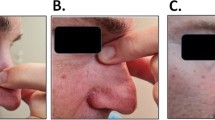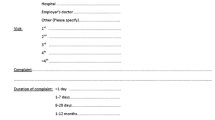Abstract
This study aims to assess the management of patients with epistaxis by general practitioners (GPs) and to show whether previous experience as a junior doctor in ear, nose and throat (ENT) surgery influences their practice. A questionnaire was sent together with self-addressed reply envelopes to a random sample of 1,000 GPs. Four hundred and twenty eight GPs replied (43% response rate). Ninety-eight percent GPs see less than five epistaxis per week. Eighty-six percent GPs seek a specialist opinion for approximately one in four patients seen. Fifty percent GPs would arrange investigations. There was a wide variation in these and the first aid advice given. Fifteen percent GPs had previous experience in ENT. The only significant difference in the management of epistaxis with these GPs is that they were 2× more likely to cauterise a nose with silver nitrate (P=0.002). There is no general consensus on the management of epistaxis by GPs and despite previous experiences in the specialty as a junior doctor, this fails to have a significant impact on the day to day management of epistaxis.

Similar content being viewed by others
References
Action on ENT good practice guide 2002. NHS modernisation agency. Department of Health
Bhalla RK, Unwin D, Jones T, Lesser T (2002) Does clinical assistant experience in ENT influence general practitioner referral rates to hospital? J Laryngol Otology 116:586–588
Department of Health (2004) http://www.nhs.uk/national plan/nhsplan.htm. Cited 11th Nov 2004
Friese G, Wojciehoski RF (2005) The nose bleeds, breaks and obstructions. Emerg Med Serv 34(8):129–130, 132–5. 137
Griffiths E (1979) Incidence of ENT problems in general practice. J R Soc Med 72:740–2
Kotecha B, Cocks RA, Rothera MP (1990) The management of epistaxis in accident and emergency departments: a survey of current practice. Arch of Emerg Med 7:35–41
Pashen D, Stevens M (2002) Management of epistaxis in general practice. Aust Fam Physician 31(8):717–21
Pond F, Sizeland A, Epistaxis (2000) Strategies for management. Aust Fam Physician 29(10):933–8
Author information
Authors and Affiliations
Corresponding author
Appendix 1
Appendix 1

Rights and permissions
About this article
Cite this article
Tassone, P., Georgalas, C., Appleby, E. et al. Management of patients with epistaxis by general practitioners: impact of otolaryngology experience on their practice. Eur Arch Otorhinolaryngol 263, 1109–1114 (2006). https://doi.org/10.1007/s00405-006-0141-8
Received:
Accepted:
Published:
Issue Date:
DOI: https://doi.org/10.1007/s00405-006-0141-8




